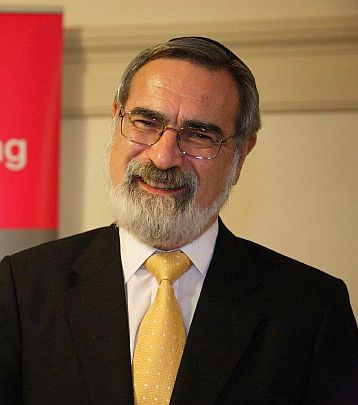Lord Jonathan Sacks
From the blog of Sr Isabel Smyth SND – Interfaith Journeys – Rabbi Lord Jonathan Sacks

Last week Rabbi Lord Jonathan Sacks died at the age of 74 which is not so old in this day and age. Although it was known that he was ill his death came as a shock to everyone who knew him, either in person or through his writings. He was a highly respected leader within his community and a great champion for Judaism but was also a towering public figure in national and civic life. He was a regular contributor to the BBC’s Thought for the Day; he sat in the House of Lords; he wrote over thirty books; he was a popular public speaker who affirmed the spiritual dimension of life and the place of religion in public life. He had a message for us all. But he was also a human being, a man who dearly loved his wife and family and perhaps the most moving tribute of all was that of his youngest daughter spoken with heartfelt sorrow and love at his funeral which had to be small because of Covid restrictions.
Two books in particular that I found helpful and inspiring were the Dignity of Difference and The Home We Build Together, both of which were a reflection on civic life and a call to face up to our responsibility for the future of the world and the society in which we live. They taught us to appreciate diversity and our unique identities within the context of a common civic identity. They taught us how to hold the tensions between the values and beliefs of our individual faiths and a secular world, all the time seeking and working for the common good. Rabbi Sacks was unashamedly and proudly Jewish. The platform from which he spoke was that of Jewish wisdom and theology but he communicated it in such a way that it spoke to the human condition and was seen as relevant to national and civic life. This is a gift I think. Religion has a lot to offer the public sphere but is often dismissed or ignored because its relevance is not obvious or understood. Those of us, like myself, who are not Jewish heard echoes of what he said in our own faith and were encouraged to reflect on how we too could speak about our faith and values in a meaningful and relevant way. This is necessary if we are to show the world that religion, which is considered by many to be problematic, can indeed by part of the solution.
The Dignity of Difference was first published in 2002 and republished twice that same year – a sign of how popular it was. Coming as it did in the aftermath of 9/11 and the talk of a clash of civilisations it was “a plea for tolerance in an age of extremism” and suggests that “One belief, more than any other…is responsible for the slaughter of individuals on the altars of the great historical ideals. It is the belief that those who do not share my faith—or my race or my ideology—do not share my humanity.”
The answer to this, Rabbi Sacks suggest in many of this talks, is to extend our understanding of the ‘we’ to include the ‘them’ and to recognise our common humanity -but not at the expense of denying difference. Diversity is a gift of God that can expand our horizons and enrich both our personal and social life. However if we are to live together in peace and harmony we have to make space for one another. We have to recognise one another, learn from one another and above all engage in dialogue with one another.
The Home We Build Together gives us a vision of how to do this. We cannot live in society as though the dominant culture is like a country house into which others are welcome as long as they conform to the host’s ways nor in a culture that is like a hotel in which we might recognise one another in passing but each living in its own silo, separated from all the others. Rather we should recognise our common home in that we are citizens of both a nation and a world that supports the future and wellbeing of us all. The very last statement in the book says it all: “What then is society? It is where we set aside all considerations of wealth and power and value people for what they are and what they give. It is where Jew and Christian, Muslim and Hindu, Buddhist and Sikh, can come together, bound by their commonalities, enlarged by their differences. It is where we join in civil conversations about the kind of society we wish to create for the sake of our grandchildren not yet born. It is where we share an overarching identity, a first language of citizenship, despite our different second languages of ethnicity or faith. It is where strangers can become friends. It is not a vehicle of salvation, but it is the most effective form yet devised for respectful coexistence. Society is the home we build together when we bring our several gifts to the common good.”
If the coronavirus and the threat of climate change have taught us anything it is that we surely share a common density, are facing common problems – problems that will only be solved if we work together to change our ways and thus safeguard this precious home we share together. Rabbi Sacks remains a living inspiration to us all.
Lord Jonathan Sacks Read More »

